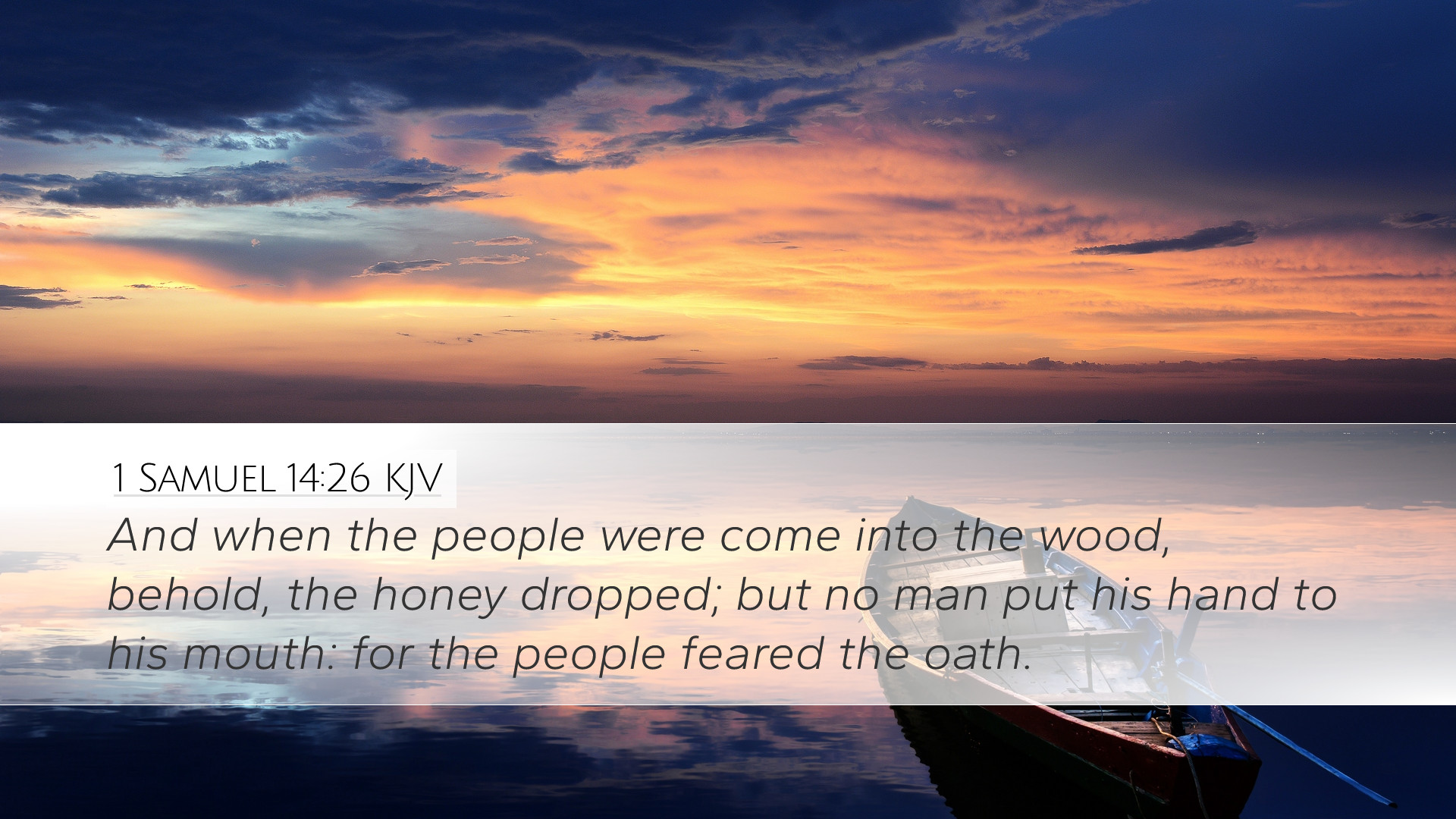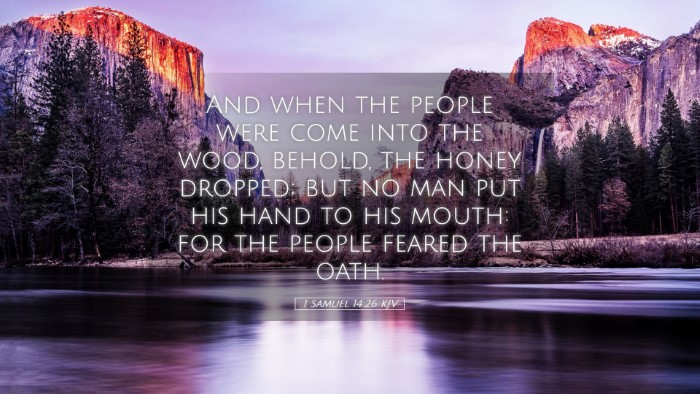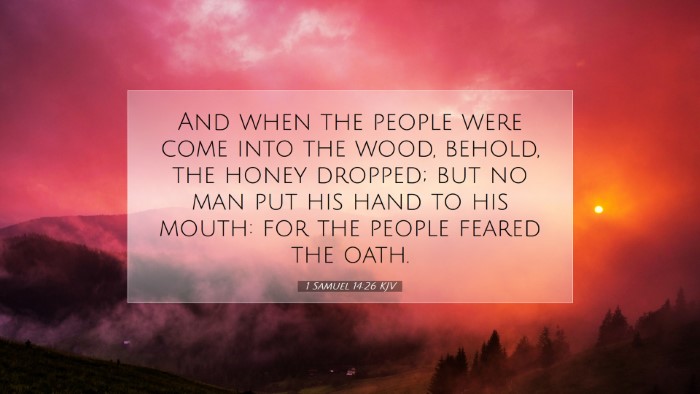Commentary on 1 Samuel 14:26
Verse: "And when the people were come into the wood, behold, the honey dropped; but no man put his hand to his mouth: for the people feared the oath."
Introduction
The narrative surrounding 1 Samuel 14 captures a critical moment in Israel's history, highlighting the dynamic between divine providence and human decisions. This commentary will delve deeply into 1 Samuel 14:26, emphasizing the implications of Saul's oath, the significance of the honey, and the broader lessons applicable to faith and leadership.
The Context of the Passage
In the backdrop of this verse, we find Prince Jonathan, son of Saul, who, during a fierce battle against the Philistines, initiates a daring act of faith by eating honey, which later leads to a significant discussion concerning the implications of his father's impulsive vow. The actions of Jonathan are contrasted starkly with the hesitance of the people and their fear of violating Saul’s command.
The Oath of Saul
1. Human Authority vs. Divine Provision
Saul's oath serves as a critical point of contention. The leaders of Israel were charged with guiding the people in accordance with God’s law, yet Saul's oath—though made with good intentions—proves to be an overreach of human authority. Matthew Henry explains that Saul's command led to unnecessary hardship for the Israelite soldiers, pointing out that “though it was meant for the good of the soldiers, it brought about their exhaustion.”
2. The Result of Fear
The text emphasizes that the people feared the oath and refrained from tasting the honey that dropped in their path. Albert Barnes remarks that this indicates a profound respect for authority, yet it also illustrates a tragic yield to human directives over divine sustenance. Fear, in this context, leads to physical and spiritual hunger, highlighting a broader theme of the tension between obedience to God and adherence to man's laws.
The Symbolism of Honey
1. The Nature of Honey
Honey is often seen in scripture as a symbol of abundance and sweetness, often referred to as one of the blessings of the land (Exodus 3:8). Adam Clarke notes that the presence of honey in the woods—representative of God’s provision—serves to underline the irony of Saul’s oath. This natural resource, although good and necessary, was made off-limits due to a rash vow.
2. Spiritual Nourishment
The honey can also symbolize spiritual nourishment. Just as the soldiers refrained from taking the honey due to fear, Christians are often hindered from receiving the fullness of God’s blessings because of rules and regulations that overshadow God’s intended grace. Matthew Henry poignantly remarks that “the best of provisions are of no use if we are denied the access to them.”
Theological Implications
This verse invites deeper theological reflection regarding human leadership and the authority of divine revelation. The soldiers' fear teaches us about the implications of leadership style; when leaders impose burdens that contradict God’s ultimate provision, it could inhibit the spiritual vitality of the people.
1. Leadership and Responsibility
Leaders are called to shepherd, not to restrict. In understanding Saul's actions, one sees the pitfalls of legalistic leadership—one that feeds on the consequences of fear rather than fostering freedom in faith. Albert Barnes indicates that “leaders must weigh their commands against the backdrop of mercy and grace.”
2. Human Nature and Obedience
The Israelites’ hesitance to eat the honey reflects the struggle of human nature against the rigidity of law. This interaction calls out the necessity of having laws that align with divine goodness—an important reminder for pastors and theologians as they teach the congregation. The reluctance of the soldiers to break the command reveals a heart disposition that often prioritizes man-made rules over divine sustenance.
3. God’s Provision Amidst Human Failings
Despite the flaws in Saul’s oversight, God’s provision continued to be present in the wilderness. This speaks to the overarching narrative of God’s grace, often highlighted by Clarke, wherein grace and mercy work in spite of human shortcomings. God’s honey—the divine provision—was still within reach, signifying the omnipresence of divine grace even in human folly.
Practical Applications
The commentary of 1 Samuel 14:26 challenges believers to consider how they respond to authority and the implications that arise from their choices. Here are several practical applications drawn from this scrutiny:
- Reflection on Authority: Evaluate the leadership you are under and consider whether it aligns with God’s Word. Are the restrictions placed upon you leading to spiritual nourishment or constraint?
- Embrace Divine Provision: Seek God’s goodness and mercy beyond human commands. Just as the soldiers were in the proximity of honey yet felt compelled to abstain, we should recognize the divine grace available amid restrictive human traditions.
- Encouragement to Leaders: Lead with compassion and grace, always remembering the larger picture of God’s redemptive plan. Evaluate your commands and teach your congregations in ways that draw them closer to God instead of away.
Conclusion
The story within 1 Samuel 14:26 lays bare the interplay of human authority, obedience, and divine mercy. As believers continue to engage with scripture, particularly passages with complex interactions of leadership and faith, this verse serves as a compelling reminder to seek God’s provisions freely and embrace the sweet goodness He offers amidst earthly struggles. The reflections from public domain commentaries add depth to our understanding, urging both leaders and congregants to foster a community marked not by fear of commands, but by the joyous consumption of divine grace.


